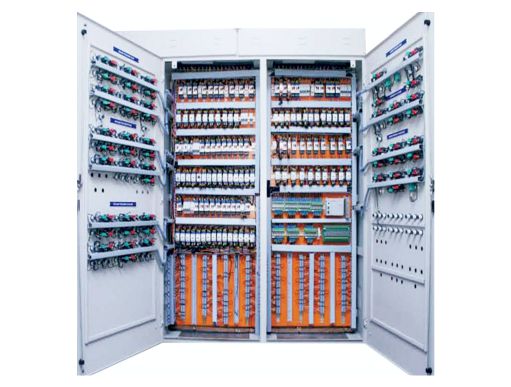PLC AUTOMATION CONTROL PANEL
Our clients can avail from us a comprehensive range of PLC Control Panels, which is extensively used for several industrial automated processes. It is manufactured as per industry standards under the strict vigil of our proficient professionals to ensure panels' optimum performance. Easy to operate, the panel has several input and output arrangements, along with different temperature ranges.
We offer concept to commissioning Automation solutions and integrating Schneider, Siemens, AB, Fuji, Delta , Mitsubishi PLCs & HMI as per your requirement.
We have offered Automation solutions & control Panels for plenty of Applications, some of them are listed below.
APPLICATIONS : Packaging Machines, Mixers, Textiles - Spinning, Dyeing and Open width & Tubular Compacting, Textile Processing Machines - Stenter, Mercerizer, Dryer, Bleaching Ranges, Paper Machines, Corrugated Box Machines, Conveyors, SPM - Special Purpose Machines (Automation solutions provided for 50+ SPM machines), Food Industry, Various Dairy Machines like NF, UF Applications etc.
FAQ's (Frequently Asked Question About PLC Automation Control Panel)
Q: What is a PLC?
PLC stands for Programmable Logic Controller. It is a specialized computer designed to control and
automate industrial processes.
Q: What are the components of a PLC?
A: A PLC consists of a central processing unit (CPU), input/output (I/O) modules, programming software,
and communication modules.
Q: What types of applications are PLCs used for?
PLCs are used in a wide range of industrial applications, including manufacturing, transportation,
energy, and building automation.
Q: How do PLCs work?
A: PLCs work by processing inputs from sensors and other devices, executing programmed logic, and
sending output signals to control devices such as motors, valves, and pumps.
Q: What programming languages are used with PLCs?
A: PLCs can be programmed using various languages, including ladder logic, function block diagrams,
structured text, and instruction list.
Q: What are the benefits of using a PLC?
A: Benefits of using a PLC include improved system reliability, increased efficiency, better process
control, and reduced downtime.
Q: How do you select a PLC?
A: Selecting a PLC requires considering factors such as the number and type of I/O modules needed,
processing speed, memory capacity, programming language, and communication protocols.
Q: How do you program a PLC?
A: Programming a PLC involves using specialized software to create a program that defines the logic and
behavior of the system. The program is then uploaded to the PLC for execution.
Q: How do you troubleshoot a PLC?
A: Troubleshooting a PLC typically involves checking the wiring and connections, verifying that the
program is correctly written and executing, and checking for any error codes or fault conditions
displayed by the PLC's interface.
Q: Can PLCs communicate with other devices?
A: Yes, PLCs can communicate with other devices using various protocols such as Ethernet/IP, Modbus,
and Profibus.
Q: What is the difference between a PLC and a DCS?
A: PLCs are designed for discrete control of individual machines or processes, while DCS (Distributed
Control Systems) are designed for process control of large-scale systems such as chemical plants or oil
refineries. DCSs typically have more advanced features such as advanced process control algorithms and
built-in redundancy for high reliability.

FEATURES :
- PLCs with 10 IO’s to 140 IO’s
- Modular PLCs – scalable from 8/4 to 4096 I/O’s with remote drops
- Special Function modules like High Accuracy, - Temperature Control
- Power transducer, PID controller output available
- PLC’s with significantly higher configurations available
- Hot backup redundant systems
- Hi-speed input & hi-speed output / PWM in built in select models
- Fully fledged RTC based calendar function
- Special Function modules like High Accuracy, Temperature Control
- Power transducer, PID controller output available
- PLC’s with significantly higher configurations available
- Hot backup redundant systems
- Hi-speed input & hi-speed output / PWM in built in select models
